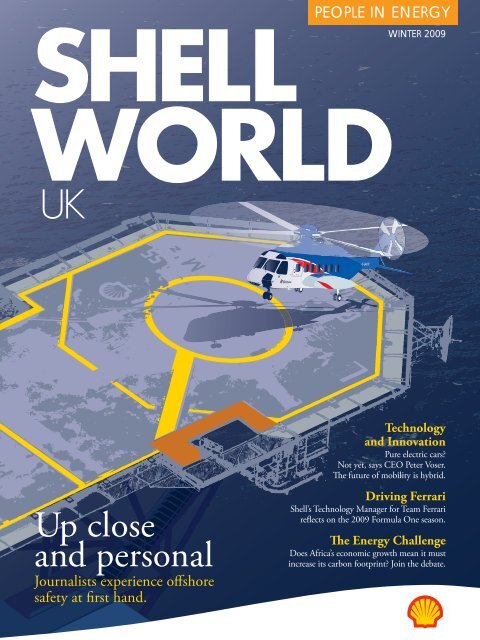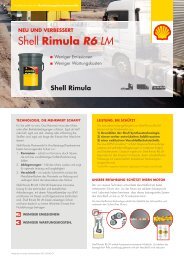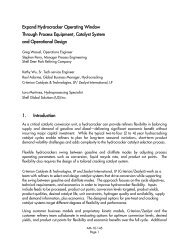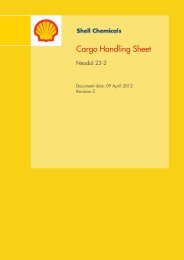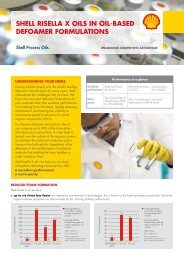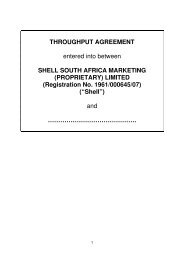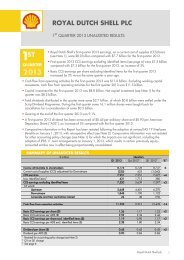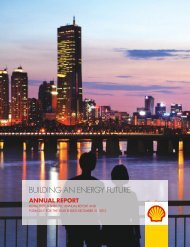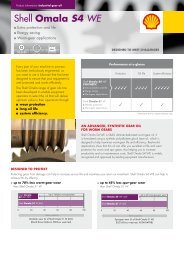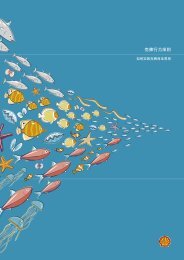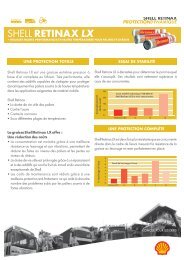Up close and personal
Up close and personal
Up close and personal
Create successful ePaper yourself
Turn your PDF publications into a flip-book with our unique Google optimized e-Paper software.
PEOPLE IN ENERGY<br />
WINTER 2009<br />
<strong>Up</strong> <strong>close</strong><br />
<strong>and</strong> <strong>personal</strong><br />
Journalists experience offshore<br />
safety at first h<strong>and</strong>.<br />
Technology<br />
<strong>and</strong> Innovation<br />
Pure electric cars?<br />
Not yet, says CEO Peter Voser.<br />
The future of mobility is hybrid.<br />
Driving Ferrari<br />
Shell’s Technology Manager for Team Ferrari<br />
reflects on the 2009 Formula One season.<br />
The Energy Challenge<br />
Does Africa’s economic growth mean it must<br />
increase its carbon footprint? Join the debate.
welcome<br />
Dear Colleagues,<br />
Welcome to the Winter 2009 issue of Shell World UK magazine.<br />
The Shell Life-Saving Rules have been in place since July <strong>and</strong> I am pleased with how<br />
actively employees <strong>and</strong> contractors seem to have understood them <strong>and</strong> are helping<br />
each other to follow them.<br />
It is clear that we are all more conscious of the risks than we used to be. The real value<br />
of the Life-Saving Rules is apparent when we see people changing their actions <strong>and</strong><br />
behaviours to comply with them.<br />
The number of health <strong>and</strong> safety awards Shell has won this year is a sign of how seriously<br />
we take the issue. Congratulations to Anasuria, Gannet <strong>and</strong> Nelson, three of our North<br />
Sea platforms that have received prestigious awards from the Royal Society for the<br />
Prevention of Accidents.<br />
Congratulations also to Brent Alpha <strong>and</strong> Brent Bravo, which each received the British<br />
Safety Council’s Sword of Honour, the most prestigious international health <strong>and</strong> safety<br />
accolade that a company can receive. The awards make it a hat trick for Shell as Brent<br />
Delta also achieved the award last year.<br />
Our Shearwater offshore installation was busy welcoming visitors during the Autumn.<br />
First came a party of UK journalists as part of a briefing on the industry’s safety<br />
performance, <strong>and</strong> then came the Chancellor of the Exchequer, Alistair Darling.<br />
You can read about the visits on pages 7-10.<br />
There is something of a health <strong>and</strong> safety theme in this issue. On page 5, read about<br />
how a project supported by the Shell Foundation has been recognised for its healthier,<br />
more efficient cooking stoves. And the Be Well programme offers some excellent advice<br />
on staying healthy – see page 20 to find out more.<br />
Finally, remember that the team at Shell World UK magazine is always interested to<br />
hear from readers. See page three for details of how to contact them.<br />
I hope you enjoy the Winter issue.<br />
John Gallagher<br />
Vice President Technical<br />
<strong>Up</strong>stream International Europe<br />
1 SHELL WORLD UK
SHELL<br />
WORLD<br />
UK<br />
CONTENTS<br />
21<br />
03<br />
EDITOR’S LETTERS<br />
Responses to your feedback <strong>and</strong> queries<br />
about the previous issue of Shell World<br />
UK magazine.<br />
05<br />
NEWS IN BRIEF<br />
Shell responds to Amnesty International,<br />
an award for major advances in solar power<br />
<strong>and</strong> recognition for a healthier stove.<br />
11<br />
LUCKY TO BE ALIVE<br />
“I didn’t bother to belt up until the<br />
12 Life-Saving Rules nagged me into it.”<br />
13<br />
DRIVING FERRARI<br />
Shell’s Technology Manager for Ferrari,<br />
Lisa Lilley, reflects on a tough season in<br />
2009 <strong>and</strong> preparations for 2010.<br />
15<br />
CHOOSING SHELL<br />
Why should people with a disability<br />
choose to work for Shell UK?<br />
17<br />
THE ENERGY CHALLENGE<br />
Shell African Network debates what<br />
Africa’s growing dem<strong>and</strong> for energy<br />
means for its carbon footprint.<br />
19<br />
PEOPLE AND<br />
ENVIRONMENT<br />
Overweight? Unfit? Smoker? Shell<br />
experts share their advice on how to<br />
live a healthier life.<br />
21<br />
TECHNOLOGY AND<br />
INNOVATION<br />
With more cars on the world’s roads,<br />
Chief Executive Officer Peter Voser says<br />
the future of mobility is hybrid.<br />
23<br />
SHELL IN THE COMMUNITY<br />
Biting winds <strong>and</strong> biting insects: the<br />
rigours of studying climate change in<br />
the tundra with Earthwatch.<br />
25<br />
OUT OF HOURS<br />
Nicola sings for her supper, while<br />
Ferry rescues a failing arts centre.<br />
UP CLOSE<br />
AND PERSONAL<br />
Journalists find<br />
out the hard way how<br />
serious Shell <strong>and</strong> the<br />
offshore industry<br />
are about safety.<br />
7<br />
SHELL WORLD UK 2
Guest Editor<br />
Martin Platt<br />
Managing Editor<br />
Kay Bruce<br />
To contact the<br />
magazine<br />
Shell World UK, CA-CX,<br />
Shell Centre, London,<br />
SE1 7NA<br />
E-Mail<br />
Shellworlduk@shell.com<br />
Website address<br />
www.shell.co.uk/<br />
shellworlduk<br />
Contributors<br />
Martin Platt<br />
Angela Everitt<br />
Judy Mackie<br />
Unless otherwise specified,<br />
copyright in text, images <strong>and</strong><br />
other information in Shell World<br />
magazine belongs to Shell<br />
International B.V. or other<br />
companies. Permission is given to<br />
reproduce, store or transmit any<br />
part of this publication provided<br />
that the copyright of Shell<br />
International B.V. or such other<br />
Shell company is acknowledged.<br />
This does not include the right to<br />
amend or modify text, images <strong>and</strong>/<br />
or other information <strong>and</strong> it does not<br />
extend to any material of which the<br />
copyright is identified as belonging<br />
to a third party (i.e. other than<br />
Shell International B.V. or other<br />
companies). Authorisation to<br />
reproduce such third-party material<br />
must be obtained from the relevant<br />
copyright holders.<br />
YOUR<br />
MAGAZINE<br />
EDITOR’S LETTERS<br />
Dear Editor<br />
I am a second year chemistry<br />
student at University College<br />
London. I underst<strong>and</strong> that<br />
many students read your<br />
magazine <strong>and</strong> I was wondering<br />
whether you could run more<br />
articles about how younger<br />
people can get involved with<br />
Shell, as you had in the<br />
Autumn issue with the college<br />
students working in the North<br />
East of Scotl<strong>and</strong> at St Fergus.<br />
Regards<br />
Mital Selarka<br />
Dear Mital<br />
We regularly include features<br />
aimed at our graduate readers<br />
<strong>and</strong> will continue to do so.<br />
Look out for future stories<br />
<strong>and</strong> go through our back<br />
issues (available on the<br />
website) for more.<br />
Dear Editor<br />
As an HIV/Aids sufferer since<br />
the early eighties – caught from<br />
a dirty needle in a makeshift<br />
jungle hospital – it was<br />
wonderful to read your article<br />
in the autumn issue about the<br />
Niger Delta.<br />
Thanks for caring. It is<br />
refreshing to know that such<br />
a prestigious company cares<br />
about Aids.<br />
Respectfully<br />
A Shell customer<br />
Name supplied<br />
Dear Shell customer<br />
Thanks for writing in. We<br />
appreciate your comments.<br />
Dear Editor<br />
Your Q&A with Peter Voser<br />
(Autumn 2009) was<br />
interesting, but is it a sign<br />
of the times that nowhere<br />
in the article did the CEO<br />
mention Shell’s still very<br />
large downstream marketing<br />
business? Nor did he use the<br />
words “customer” or “br<strong>and</strong>”.<br />
Yours etc.<br />
Paddy Briggs<br />
Pensioner<br />
Dear Paddy<br />
Thanks for your feedback.<br />
Peter Voser may not have<br />
mentioned Shell’s<br />
downstream marketing<br />
business in the Autumn<br />
issue, but he did cover the<br />
subject in a recent talk with<br />
employees at Shell Centre<br />
in London <strong>and</strong> he will do<br />
so again in an interview in<br />
the Spring issue.<br />
MEET THE TEAM<br />
If you have any feedback or would<br />
like to suggest content, please<br />
contact us.<br />
Shellworlduk@shell.com<br />
Shell World UK, CA-CX,<br />
Shell Centre, London,<br />
SE1 7NA<br />
Martin Platt<br />
Guest Editor<br />
Email: Shellworlduk@shell.com<br />
Kay Bruce<br />
Managing Editor<br />
Shell UK Communications<br />
Sarah Marshall<br />
Shell UK Communications<br />
Sarah takes over as Managing<br />
Editor from December 1. Please<br />
contact her if you would like to<br />
suggest a story for the Spring<br />
issue of Shell World UK.<br />
Email: Sarah.Marshall@shell.com<br />
Ph: +44 (0)20 7934 2260<br />
WE USE RECYCLED PAPER<br />
We use 50% Recycled Waste <strong>and</strong> 50% Virgin Fibre<br />
material, which conforms to criteria set by<br />
Government for Recycled Papers.<br />
3 SHELL WORLD UK
FUN WITH<br />
SCIENCE<br />
Hundreds of children<br />
had fun at the Shell<br />
Education Service<br />
Family Science Days<br />
in<br />
October.<br />
Shell families <strong>and</strong> local residents<br />
learnt all about electricity, energy<br />
transfer, forces <strong>and</strong> motion <strong>and</strong><br />
materials in Glasgow <strong>and</strong><br />
Fraserburgh. The Family Science<br />
Days are being held near Shell’s main<br />
UK locations throughout the academic year.<br />
Shell Education Service (SES) runs unique,<br />
interactive science workshops for 50,000<br />
young children every year. The workshops<br />
are delivered by experts <strong>and</strong> are designed<br />
to support UK science curriculums.<br />
Research for SES last year found that,<br />
although a third of the 400 Scottish 9-14<br />
year-olds polled said they were inspired<br />
by science, many had decided not to<br />
study it beyond 16. SES hopes its work<br />
will encourage children to choose a<br />
career in science.<br />
To fi nd out more, visit<br />
www.shell.co.uk/ses<br />
SUBSCRIBE TO SHELL WORLD UK MAGAZINE<br />
Add your details to our distribution list via our website at<br />
www.shell.co.uk/signup, or write to us at Shellworlduk@shell.com<br />
SHELL<br />
WORLD<br />
UK<br />
SHELL L<br />
WORLD<br />
UK<br />
4
NEWS<br />
IN BRIEF<br />
Bonny Isl<strong>and</strong>, Nigeria<br />
SHELL RESPONDS TO<br />
AMNESTY REPORT<br />
Shell’s Country Chair for<br />
Nigeria, Basil Omiyi, has<br />
said an Amnesty International<br />
report on the situation in the<br />
Niger Delta does not present<br />
a balanced account <strong>and</strong> is<br />
therefore of limited value.<br />
“I believe claims in the report are based on<br />
a lack of underst<strong>and</strong>ing of the realities on<br />
the ground,” says Basil.<br />
“The root causes of the Niger Delta’s<br />
humanitarian issues are poverty,<br />
corruption, crime, militancy <strong>and</strong> violence.<br />
Unfortunately, the Amnesty report does<br />
not acknowledge these issues to any<br />
substantive degree, but concentrates<br />
on the impact of oil <strong>and</strong> gas operations<br />
in isolation.”<br />
Amnesty published Petroleum, Pollution<br />
<strong>and</strong> Poverty in the Niger Delta in June<br />
2009. It examines oil spills, gas fl aring,<br />
waste dumping <strong>and</strong> other environmental<br />
impacts of the oil industry in the region.<br />
Amnesty says the people of the Niger Delta<br />
have seen their human rights abused by oil<br />
companies that their government cannot or<br />
will not hold to account.<br />
Basil Omiyi says heavily armed, well<br />
organised groups have attacked oil<br />
facilities, shut down operations, kidnapped<br />
staff, stolen vast amounts of crude oil <strong>and</strong><br />
sabotaged facilities <strong>and</strong> pipelines.<br />
Basil Omiyi<br />
“Most of the oil spilt from Shell operations<br />
(85% in 2008) is the direct result of<br />
criminal activities perpetrated by militant<br />
groups,” says Basil. “Whatever the cause,<br />
as soon as it is safe to do so, Shell takes<br />
steps to stop the source of the spill <strong>and</strong><br />
clean it up in accordance with extensive<br />
national legislation. We also openly report<br />
on every oil spill.”<br />
Read Basil Omiyi’s full statement online at<br />
www.shell.co.uk/shellworlduk<br />
What impact will Africa’s development<br />
have on its carbon footprint? Read<br />
about it on pages 17–18.<br />
KITCHEN HEROES<br />
Time magazine has named a project<br />
supported by Shell Foundation one of<br />
its annual Heroes of the Environment<br />
for developing a more effi cient <strong>and</strong><br />
healthier cooking stove.<br />
The stove was developed by Nathan<br />
Lorenz <strong>and</strong> Tim Bauer for Envirofi t, a<br />
not-for-profi t organisation they set up at<br />
Colorado State University.<br />
According to the World Health<br />
Organisation, almost half the world’s<br />
population cooks indoors on stoves<br />
fuelled by wood, dung <strong>and</strong> crop waste.<br />
The resulting indoor air pollution kills<br />
1.5 million people a year, most of them<br />
women <strong>and</strong> children under fi ve years old.<br />
Since being launched in May 2008, more<br />
than 60,000 Envirofi t stoves have been<br />
sold in India.<br />
“It was a big honour to be named one of<br />
Time’s Heroes of the Environment,” said<br />
Nathan <strong>and</strong> Tim. “The work we are doing<br />
in partnership with Shell Foundation has a<br />
huge potential for making an impact on a<br />
large scale.”<br />
As part of its Breathing Space programme,<br />
Shell Foundation contributed $3.5 million<br />
to Envirofi t’s investment fund of $25 million<br />
5 SHELL WORLD UK
Richard Swanson<br />
SOLAR POWER ADVANCE WINS AWARD<br />
The President <strong>and</strong> Chief<br />
Technology Offi cer of<br />
SunPower Corporation,<br />
Richard Swanson, won<br />
The Economist’s Innovation<br />
Award for Energy <strong>and</strong> the<br />
Environment 2009 for his<br />
work on the development<br />
of highly effi cient solar-cell<br />
technology. The award is<br />
sponsored by Shell.<br />
Swanson <strong>and</strong> California-based SunPower<br />
researched ways of increasing the effi ciency<br />
of solar cells while reducing the use of<br />
polycrystalline silicon, which is in short<br />
supply. As a result, solar panels now have a<br />
conversion effi ciency of 19.3%, a major<br />
step towards achieving the US Department<br />
of Energy’s goal of 20% by 2020.<br />
“When SunPower was founded almost a<br />
quarter century ago, solar was little more<br />
than a concept,” said Richard Swanson.<br />
“Today, it is within reach of becoming<br />
mainstream throughout much of the world,<br />
<strong>and</strong> it is highly gratifying to be a part of<br />
this energy revolution.”<br />
One judge said Swanson’s work was<br />
“a fundamental contribution to the<br />
growth of solar photovoltaic renewable<br />
energy production”.<br />
Dr Sergio Kapusta, Shell’s Chief Scientist,<br />
Materials, said Richard Swanson had<br />
shown that innovation was as much about<br />
making incremental improvements to<br />
existing technology as about coming up<br />
with the next big idea.<br />
Innovation is<br />
as much about<br />
making incremental<br />
improvements to<br />
existing technology<br />
as about coming<br />
up with the next<br />
big idea.<br />
<strong>and</strong> is helping it open new distribution<br />
channels to poor communities in south<br />
<strong>and</strong> west India.<br />
“The only way we are going to make a<br />
sustainable difference to such a massive<br />
problem is to come up with solutions that<br />
can be delivered at scale,” said Shell<br />
Foundation Director Chris West.<br />
“Envirofi t’s stoves - which pay for themselves in<br />
6-8 months because people only have to buy<br />
half as much wood compared to using an<br />
open fi re - have the potential to do just that.”<br />
Envirofi t hopes to sell 10 million improved<br />
stoves worldwide in the next fi ve years.<br />
An Envirofi t stove in use.<br />
Find out more by visiting www.shellfoundation.org/breathingspace<br />
SHELL WORLD UK 6
UP CLOSE AND<br />
PERSONAL WITH<br />
OFFSHORE SAFETY<br />
In September, a party of journalists underwent rigorous<br />
training to better underst<strong>and</strong> an industry whose wholehearted<br />
commitment to safety is often under-estimated by the<br />
wider world. Tough? You better believe it.<br />
7 SHELL WORLD UK
<strong>and</strong> procedures of their companies,”<br />
explains instructor Rhys Jones.<br />
TUESDAY SEPTEMBER 29<br />
GREENHORNS TO GREEN HATS<br />
The journalists – from the Independent <strong>and</strong><br />
Herald newspapers, Reuters news agency<br />
<strong>and</strong> <strong>Up</strong>stream magazine – arrive in<br />
Aberdeen as guests of Shell <strong>Up</strong>stream<br />
International Europe <strong>and</strong> Oil & Gas UK,<br />
the offshore industry association.<br />
They are, shall we say, somewhat<br />
apprehensive about the day ahead.<br />
As anyone with an inkling of offshore<br />
survival training knows, sooner<br />
or later they’ll fi nd themselves in an<br />
underwater escape. Not the real thing,<br />
of course, but still a bit scary.<br />
Helicopter underwater escape training<br />
(HUET) is a key part of the three-day basic<br />
offshore safety induction <strong>and</strong> emergency<br />
training course (BOSIET), delivered to all<br />
new offshore recruits by international<br />
provider Petrofac Training Services. They<br />
go on a refresher course every four years.<br />
MYTH<br />
For newcomers, the helicopter escape<br />
training is often daunting. But the big smiles<br />
afterwards always confi rm that – as with<br />
offshore safety performance – the myth is<br />
worse than the reality.<br />
First comes the theory, then explanation,<br />
demonstration, participation <strong>and</strong><br />
assessment. “It’s our job to help trainees<br />
build a base level of skill that they can<br />
then apply to their particular working<br />
environment, supported by the policies<br />
During the general safety induction, the<br />
journalists learn about the hazards that can<br />
be encountered offshore <strong>and</strong> they’re<br />
instructed about which items require permits<br />
<strong>and</strong> which are prohibited.<br />
The offshore installation familiarisation then<br />
explains the common alarm signals <strong>and</strong><br />
the action required; how to wear survival<br />
suits (three layers of clothing are advised),<br />
how to use lifejackets <strong>and</strong> survival grab<br />
bags, <strong>and</strong> how to evacuate a platform<br />
safely. They also learn about the industry’s<br />
search <strong>and</strong> rescue resources, what to do if<br />
you’re a passenger on a lifeboat, <strong>and</strong><br />
how Shell is set up to respond to an<br />
emergency, both offshore <strong>and</strong> onshore.<br />
TENSION<br />
Brains now bursting with information –<br />
<strong>and</strong> this is just a shortened version of the<br />
offshore safety course – the group then<br />
hears about fi re prevention, the theory of<br />
fi re, <strong>and</strong> fi re-fi ghting methods. They<br />
practise how to use a smoke hood <strong>and</strong><br />
how to escape from a smoke-fi lled room.<br />
Then it’s through to the state-of-the-art<br />
training pool for the helicopter escape<br />
training. Again, theory comes fi rst:<br />
helicopter awareness, heliport procedure,<br />
the Civil Aviation Authority safety briefi ng,<br />
a briefi ng on what’s about to happen,<br />
<strong>and</strong> how to use the emergency breathing<br />
system (EBS).<br />
The helicopter training exercise starts<br />
deceptively gently, with the simulator being<br />
lowered slowly onto the water <strong>and</strong> the<br />
passengers, wearing their EBS, stepping<br />
onto the aviation heli-raft.<br />
Preparing to fl y<br />
SHELL WORLD UK 8
The journalists in training<br />
But then the tension is ratcheted up.<br />
The simulator is submerged, leaving an air<br />
space above the passengers’ heads, <strong>and</strong><br />
they have to escape through the unglazed<br />
windows. They repeat the procedure, but<br />
this time with push-out window panes,<br />
before reaching the climax of the exercise<br />
– the full capsizing experience, with the<br />
simulator performing an underwater roll.<br />
The journalists emerge from the water<br />
exhilarated <strong>and</strong> relieved. “The helicopter<br />
escape training was very challenging,”<br />
Mark Williamson of The Herald confi des<br />
afterwards. “I was apprehensive about it<br />
<strong>and</strong> very pleased I managed to complete it.”<br />
INTENSITY<br />
How does Rhys Jones think they performed?<br />
“The group was quiet at fi rst, but gradually<br />
became more engaged,” says Rhys. “I think<br />
they were taken aback, as many people<br />
are, at the intensity of the training the<br />
offshore workforce receives.<br />
“You only have to look at the Health &<br />
Safety Executive statistics to see that<br />
offshore industry safety training st<strong>and</strong>ards<br />
are very high compared with those of other<br />
industries – <strong>and</strong> the journalists’ experience<br />
here reinforces that.”<br />
Reuters reporter Tom Bergin adds: “At times,<br />
it felt tediously repetitive, but it’s clearly all<br />
necessary. When you hit the water in the<br />
training module, you realise how much<br />
there is to remember to do, so all the<br />
drilling suddenly makes sense.”<br />
ISSUES AND CHALLENGES<br />
Later, the journalists attend a dinner<br />
hosted by John Gallagher, Vice President<br />
Technical, Shell <strong>Up</strong>stream International<br />
Europe (UIE), Malcolm Webb, Oil & Gas<br />
When you hit the water<br />
in the training module,<br />
you realise how much<br />
there is to remember to<br />
do, so all the drilling<br />
suddenly makes sense.<br />
UK’s Chief Executive, <strong>and</strong> Robert Paterson,<br />
its Director of Health, Safety <strong>and</strong><br />
Employment Issues.<br />
Robert explains the implications of the<br />
Health & Safety Executive’s 2007 report<br />
on the offshore industry’s asset integrity<br />
management – how it ensures that<br />
equipment is safe, reliable <strong>and</strong> effi cient.<br />
The report, known as Key Programme 3,<br />
revealed signifi cant issues about the safety<br />
of systems used in major accident hazard<br />
control. Ali McDougall, Operations<br />
Manager for the Brent fi eld, gives a<br />
presentation on past safety issues <strong>and</strong><br />
Shell’s signifi cant asset integrity investments<br />
in Brent. The leaders outline the challenges<br />
facing the industry in today’s climate of<br />
high operating <strong>and</strong> fi scal costs.<br />
Shortly after the journalists returned to l<strong>and</strong>,<br />
the subject received welcome exposure in<br />
The Independent, The Herald <strong>and</strong> Reuters’<br />
international media partners.<br />
WEDNESDAY SEPTEMBER 30<br />
SHEARWATER’S SHEER<br />
SCALE IMPRESSES ALL<br />
Bolstered by an early breakfast,<br />
the journalists board a helicopter for<br />
their one-hour journey to the<br />
Shearwater platform.<br />
It’s a sunny day, giving an excellent view<br />
of Shearwater’s massive nine-storey<br />
structure. Offshore Installation Manager<br />
Graham Sheedy escorts his guests to the<br />
cinema for their safety induction.<br />
“We look out for each other on<br />
Shearwater,” he tells them. “It’s all about<br />
interdependency <strong>and</strong> being responsible for<br />
other people’s safety, as well as our own.<br />
We’re very proud of our platform <strong>and</strong><br />
coming offshore, you can begin to<br />
underst<strong>and</strong> the challenges we face <strong>and</strong> the<br />
high st<strong>and</strong>ards of safety for which we<br />
continuously strive.”<br />
TEAMWORK<br />
Dave Blackburn, Central Platforms<br />
Operations Manager, adds: “You have to<br />
be a special type of person to work on a<br />
platform, but there is the most incredible<br />
atmosphere <strong>and</strong> teamwork.”<br />
SHEARWATER<br />
FACTS<br />
■ The Shell-operated Shearwater cluster<br />
consists of the Shearwater, Scoter,<br />
Merganser <strong>and</strong> Starling fi elds. It’s 125<br />
miles (200km) east of Aberdeen <strong>and</strong><br />
was inaugurated in September 2000.<br />
■ The Shearwater platform is a fi xed,<br />
manned installation comprising a<br />
wellhead platform connected by an<br />
80m bridge to a process, utilities <strong>and</strong><br />
living quarters platform.<br />
■ Its integrated deck was installed in<br />
a global record-breaking single lift by<br />
the world’s largest lifting vessel.<br />
■ Shearwater gas is sweetened,<br />
dehydrated <strong>and</strong> conditioned to the<br />
quality required for domestic use, then<br />
pumped to the Bacton gas terminal in<br />
Norfolk. Oil <strong>and</strong> natural gas liquids are<br />
exported to the Forties pipeline system.<br />
9 SHELL WORLD UK
You have to be a<br />
special type of person<br />
to work on a platform,<br />
but there is the most<br />
incredible atmosphere<br />
<strong>and</strong> teamwork.<br />
The highlight is undoubtedly the platform<br />
tour. Graham explains the challenges of<br />
producing gas from a high-pressure,<br />
high-temperature reservoir <strong>and</strong> shows them<br />
the wellheads. He also describes the new<br />
low-pressure compression project, which<br />
increases the amount of oil <strong>and</strong> gas<br />
recovered by reducing the pressure in the<br />
fl owlines from the reservoirs.<br />
“It’s fascinating to see a working<br />
platform,” says Tom Bergin. “The scale of<br />
the operation is really only evident up<br />
<strong>close</strong>. It also gives a unique insight into<br />
how hostile the environment is <strong>and</strong> how<br />
important it is to have effective safety<br />
procedures <strong>and</strong> practices.”<br />
Mark Williamson adds: “It’s really<br />
impressive. There’s a bewildering array of<br />
processes <strong>and</strong> machinery. I’ve been<br />
offshore before, but seeing Shearwater is a<br />
reminder of what an incredible feat of<br />
engineering these platforms are.”<br />
The bracing North Sea air has whipped<br />
up an appetite <strong>and</strong> it’s back to the bridgelinked<br />
accommodation module for lunch.<br />
They’re joined by 19-year-old Apprentice<br />
Instrument Technician Asia Hutchison.<br />
“I love it – I wouldn’t do anything else.<br />
Everyone is very friendly,” she tells the<br />
journalists. Asia, from Buckie in<br />
Aberdeenshire, joined the platform in<br />
May, having completed the Oil & Gas<br />
Academy’s Offshore Apprentice Technician<br />
course <strong>and</strong> Shell’s onshore training.<br />
SAFETY<br />
Later, she tells Shell World UK: “It’s great<br />
that the media came out to see what we’re<br />
doing. They were surprised at the number<br />
of safety measures taken offshore, which I<br />
think is a good thing.”<br />
Before leaving, The Herald interviews<br />
Graham Sheedy for one of its website<br />
Bizcasts <strong>and</strong> hears about his dual role as<br />
installation manager <strong>and</strong> on-site controller in<br />
the event of an emergency. Graham says<br />
he enjoys working offshore: “It’s exciting<br />
<strong>and</strong> dynamic. The hours can be long, the<br />
weather is not always pleasant <strong>and</strong> you<br />
can miss important family occasions.<br />
“But I don’t have to commute through busy<br />
streets every day <strong>and</strong> the home time is great.<br />
My son is doing his offshore survival course,<br />
so if I’m recommending my own son to go<br />
offshore, that’s recommendation indeed.”<br />
Chancellor of the Exchequer<br />
Alistair Darling visited<br />
Shearwater in October<br />
Asia Hutchison<br />
PETROFAC<br />
TRAINING SERVICES<br />
A WORD FROM THE HOSTS…<br />
… AND FROM A GUEST<br />
■<br />
Trains more than 50,000 people a<br />
year, 10,000 of them in survival,<br />
providing the fi rst step to a career in<br />
the offshore industry.<br />
Home of the basic offshore safety<br />
induction <strong>and</strong> emergency training<br />
course (BOSIET). The course – which<br />
originated 30 years ago in the UK’s<br />
fi rst fi re training centre for offshore<br />
personnel <strong>and</strong> was formerly known as<br />
the RGIT – remains a key part of<br />
Petrofac’s offering.<br />
Find out more at<br />
www.petrofactraining.com.<br />
■<br />
■<br />
We were pleased the<br />
journalists were prepared<br />
to give us two days of<br />
their time. The briefi ng<br />
formed part of the UK<br />
media programme to<br />
proactively engage on<br />
key issues for Shell.<br />
John Gallagher,<br />
Vice-President<br />
Technical,<br />
Shell <strong>Up</strong>stream<br />
International<br />
Europe (UIE)<br />
Every year, Oil & Gas<br />
UK teams up with one<br />
of our member companies<br />
to take journalists offshore<br />
to give them some context<br />
for the industry’s challenges<br />
<strong>and</strong> achievements. I think it<br />
was an impressive<br />
experience for the journalists<br />
– they were wide-eyed<br />
throughout the visit.<br />
Sally Fraser,<br />
Press & PR Manager,<br />
Oil & Gas UK<br />
It’s always positive<br />
to be able to observe<br />
an activity in practice.<br />
The experiences on the<br />
platform will be included<br />
in a package of stories<br />
about the North Sea<br />
<strong>and</strong> Aberdeen. Also,<br />
it will doubtless inform<br />
our reporting on the<br />
North Sea.<br />
Tom Bergin,<br />
Reuters<br />
SHELL WORLD UK 10
LUCKY<br />
TO BE ALIVE<br />
SHELL CONTRACTOR DEBBIE HARTNETT NEVER USED TO<br />
BOTHER WITH A SEAT BELT, BUT AFTER SEEING REMINDERS<br />
OF SHELL’S 12 LIFE-SAVING RULES, SHE CHANGED HER MIND.<br />
Every day, I drive hundreds of miles<br />
around Houston in Texas checking<br />
medical supplies at the various offi ces my<br />
company delivers to. I had never<br />
bothered with a seat belt as I have to<br />
climb in <strong>and</strong> out of my van so many times<br />
a day. It was just too much hassle for<br />
such short trips.<br />
In June, Shell Real Estate had a<br />
contractor safety meeting at which they<br />
rolled out the Life-Saving Rules. Most of<br />
them didn’t apply directly to my job, but it<br />
made me think about wearing a seat belt<br />
<strong>and</strong> using a mobile phone while driving,<br />
neither of which is illegal in the state<br />
of Texas.<br />
After the meeting, I started to wear my<br />
seat belt whenever I thought about it, but<br />
to be honest, I wasn’t very consistent.<br />
After years of not doing it, it was hard to<br />
break the habit.<br />
Two weeks later, I was visiting one of<br />
Shell’s offi ces, <strong>and</strong> in every break room,<br />
I was confronted by the Life-Saving Rules<br />
icons <strong>and</strong> the “Wear your seat belt”<br />
message kept jumping out. I probably saw<br />
the poster about 15 times while I was in the<br />
building <strong>and</strong> by the time I left, I had made<br />
a fi rm decision always to wear my seat belt.<br />
A LOUD BANG<br />
I left the offi ce <strong>and</strong> joined the freeway to get<br />
to my next appointment. I remember seeing a<br />
mobile crane behind me, but thought no more<br />
of it. The traffi c was fl owing at a steady<br />
70mph (110kph), but after a few miles, the<br />
traffi c slowed down <strong>and</strong> came to a stop.<br />
The next thing I knew, I heard a loud bang<br />
<strong>and</strong> felt myself being fl ipped around. The<br />
impact knocked me unconscious. When I<br />
regained consciousness, I could see the<br />
sky, as there was very little of the van left<br />
except for the seat I was strapped into.<br />
It turns out that<br />
if I hadn’t been<br />
wearing my seat belt,<br />
the angle of the impact<br />
would have thrown me<br />
into the path of the<br />
mobile crane. The<br />
seatbelt <strong>and</strong> the airbag<br />
had saved my life.<br />
THE 12 LIFE-SAVING RULES<br />
1<br />
7<br />
WORK WITH A<br />
VALID WORK<br />
PERMIT WHEN<br />
REQUIRED<br />
DO NOT<br />
WALK UNDER A<br />
SUSPENDED LOAD<br />
2VERIFY ISOLATION<br />
BEFORE WORK BEGINS<br />
AND USE THE SPECIFIED<br />
LIFE PROTECTING<br />
EQUIPMENT<br />
8<br />
NO ALCOHOL<br />
OR DRUGS WHILE<br />
WORKING OR<br />
DRIVING<br />
3 4 9<br />
10<br />
OBTAIN<br />
AUTHORISATION<br />
BEFORE OVERRIDING<br />
OR DISABLING SAFETY<br />
CRITICAL EQUIPMENT<br />
WEAR YOUR<br />
SEAT BELT<br />
CONDUCT GAS<br />
TESTS WHEN<br />
REQUIRED<br />
DO NOT<br />
SMOKE OUTSIDE<br />
DESIGNATED<br />
SMOKING AREAS<br />
5<br />
11<br />
OBTAIN<br />
AUTHORISATION<br />
BEFORE ENTERING A<br />
CONFINED SPACE<br />
WHILE DRIVING,<br />
DO NOT USE YOUR<br />
PHONE AND DO NOT<br />
EXCEED SPEED LIMITS<br />
6<br />
PROTECT YOURSELF<br />
AGAINST A FALL WHEN<br />
WORKING AT HEIGHT<br />
12<br />
FOLLOW<br />
PRESCRIBED JOURNEY<br />
MANAGEMENT PLAN<br />
11 SHELL WORLD UK
SHELL’S VIEW<br />
Shell’s regulations state that all reports of<br />
non-compliance with the Life-Saving Rules<br />
will be thoroughly investigated.<br />
The remains<br />
of Debbie’s van<br />
(mobile phone<br />
photographs).<br />
Failure to comply with any Life-Saving Rule will<br />
result in maximum appropriate disciplinary action, up to <strong>and</strong> including<br />
termination of employment, or discharge in the case of contractors.<br />
IF YOU CHOOSE TO BREAK THE RULES,<br />
YOU CHOOSE NOT TO WORK FOR SHELL.<br />
Afterwards, I was told that the crane had<br />
driven through me <strong>and</strong> that the lowered<br />
jib, complete with industrial-sized hooks,<br />
had picked up my van <strong>and</strong> ripped the<br />
roof off. Its huge wheels had crushed the<br />
passenger side of my van. The fi rst police<br />
offi cer on the scene said he just called<br />
the mortuary to come <strong>and</strong> pick up my<br />
body; he didn’t think anyone could<br />
have survived.”<br />
WHAT COULD HAVE BEEN<br />
It turns out that if I hadn’t been wearing my<br />
seat belt, the angle of the impact would<br />
have thrown me into the path of the mobile<br />
crane. The seat belt <strong>and</strong> the airbag had<br />
saved my life. In fact, I walked away from<br />
the wreck with only minor injuries.<br />
I had had a <strong>close</strong> escape <strong>and</strong> was truly<br />
lucky to be alive. The doctors at the hospital<br />
had a picture of the accident scene <strong>and</strong><br />
they were amazed that I hadn’t broken a<br />
single bone. I have Shell’s Life-Saving Rules<br />
to thank for that.<br />
The crane had hit my van at high speed<br />
<strong>and</strong> the authorities believe the driver<br />
hadn’t noticed the traffi c stopping<br />
because he had been texting on his<br />
mobile phone. This really drove home the<br />
logic behind the Life-Saving Rule about<br />
not using mobile phones while driving.<br />
If my phone rings now, I just let it ring<br />
until I’ve stopped somewhere.<br />
LIFE SAVER<br />
I frequently think about how Shell’s<br />
Life-Saving Rules saved my life. I wouldn’t<br />
be here if it hadn’t been for the safety<br />
meeting <strong>and</strong> the constant reminders.<br />
Every day I wake up <strong>and</strong><br />
appreciate how lucky<br />
I am to be alive.<br />
Did you know?<br />
After 40 years of campaigning (remember<br />
“clunk click every trip”?) <strong>and</strong> laws enforcing<br />
their use, pretty well everyone in the UK<br />
accepts that wearing a seat belt is the right<br />
thing to do, even if they don’t always do it.<br />
But it seems the message about mobile<br />
phones <strong>and</strong> driving – what Debbie Hartnett<br />
believes caused her crash – has yet to get<br />
through (although it probably has to the<br />
following people – none of them Shell<br />
employees or contractors).<br />
Philippa Curtis from Suffolk, who sent <strong>and</strong><br />
received more than 20 text messages before<br />
she crashed into another car, killing its driver,<br />
was jailed for 21 months in February this year.<br />
Amazingly, Curtis told Oxford Crown Court<br />
that she felt there were times when using a<br />
phone while driving was acceptable.<br />
Lorry driver Scott Baldwin from Exeter was<br />
jailed for six years in April last year after<br />
admitting killing a man when he crashed<br />
into a tractor as he wrote text messages.<br />
And Kiera Coultas, who was texting when<br />
she hit <strong>and</strong> killed a cyclist in Southampton,<br />
was sentenced to four years in prison in<br />
February last year.<br />
Department for Transport statistics show that<br />
19 people were reported killed on the UK’s<br />
roads as a result of drivers using mobile<br />
phones in 2008. A further 71 were seriously<br />
injured <strong>and</strong> 399 were slightly injured.<br />
Source: BBC News Online<br />
THE PENALTIES<br />
IN THE UK<br />
• For using a h<strong>and</strong>-held phone, £60<br />
<strong>and</strong> three points on your licence.<br />
• Causing death while using a mobile<br />
phone, up to seven years in jail.<br />
• Failure to wear a seatbelt, a<br />
fixed penalty notice of £60, but<br />
you can be fined up to £500.<br />
SHELL WORLD UK 12
DRIVING<br />
FERRARI<br />
IT’S NOT ALL GLAMOUR AND EXCITEMENT IN FORMULA ONE.<br />
WITH THE SEASON OVER, SHELL’S TECHNOLOGY MANAGER FOR FERRARI,<br />
LISA LILLEY, REFLECTS ON 2009 AND PREPARATIONS FOR 2010.<br />
We’ve been working on our new fuels <strong>and</strong> oils for<br />
months now so we’ll be in a strong position when<br />
Bahrain kicks off the 2010 season in March.<br />
Lisa <strong>and</strong> Ferrari driver Felipe Massa<br />
HOW WOULD YOU SUM UP THE<br />
SEASON LISA?<br />
It’s been a tough season for Ferrari.<br />
In this sport, you can be fl ying high one<br />
year <strong>and</strong> battling it out with your<br />
competitors the next. In 2008, Ferrari<br />
won its 16th constructors’ title <strong>and</strong> Felipe<br />
Massa almost won the drivers’ title.<br />
This year, our competitors made big<br />
advances, Felipe was badly injured in an<br />
accident in the Hungarian Gr<strong>and</strong> Prix <strong>and</strong><br />
we only won one race, the Belgian<br />
Gr<strong>and</strong> Prix. But we still fi nished fourth in<br />
the constructors’ championship.<br />
HOW DID SHELL PRODUCTS PERFORM<br />
FOR FERRARI?<br />
I think they did pretty well. We supply<br />
V-Power racing fuel, Helix engine oil <strong>and</strong><br />
Spirax gear oil <strong>and</strong> it’s my responsibility<br />
to make sure our products provide the<br />
drivers with their best possible chance<br />
of success.<br />
The Formula One fuel regulations are<br />
changing next year – not something that<br />
happens often. Shell lobbied hard for the<br />
changes <strong>and</strong> we believe they will give us<br />
more freedom to try new additives <strong>and</strong><br />
formulations <strong>and</strong> underst<strong>and</strong> more about<br />
fuel technology, ultimately to the benefi t of<br />
the motorist. That commitment to innovation<br />
is why we’re in Formula One.<br />
We’ve been working on our new fuels <strong>and</strong><br />
oils for months now so we’ll be in a strong<br />
13 SHELL WORLD UK
CONSTRUCTORS’ WORLD CHAMPIONSHIP 2009<br />
1 BRAWN-MERCEDES 172 points<br />
2 RBR-RENAULT 153.5<br />
3 McLAREN-MERCEDES 71<br />
4 FERRARI 70<br />
5 TOYOTA 59.5<br />
6 BMW SAUBER 36<br />
7 WILLIAMS-TOYOTA 34.5<br />
8 RENAULT 26<br />
9 FORCE INDIA-MERCEDES 13<br />
10 STR-FERRARI 8<br />
Lisa in the Shell Track Laboratory<br />
with colleague Lucy Taylor<br />
position when Bahrain kicks off the 2010<br />
season in March.<br />
DESCRIBE A TYPICAL RACE WEEKEND.<br />
Things generally start getting busy<br />
for me from Friday, when I have technical<br />
discussions about our products with the<br />
Ferrari engineers <strong>and</strong> deal with any<br />
last-minute requests <strong>and</strong> changes.<br />
There are also the first two free practice<br />
sessions, <strong>and</strong> often a media lunch<br />
to squeeze in.<br />
By Saturday, it’s even busier, with the<br />
fi nal free practice session <strong>and</strong> qualifying.<br />
I spend a lot of time in the Shell Track Lab<br />
with two colleagues who analyse the fuel<br />
<strong>and</strong> oils. In between, I may be required to<br />
host VIP tours <strong>and</strong> media events <strong>and</strong> be<br />
interviewed by fi lm crews. It’s a very busy<br />
few days <strong>and</strong> quite a relief when we get<br />
to Sunday <strong>and</strong> the race itself.<br />
WHAT IS IT LIKE BEING ONE OF A SMALL<br />
NUMBER OF WOMEN IN MOTOR SPORT?<br />
One advantage is that, as there are so few<br />
women, the other team members get to<br />
know who you are very quickly. From a<br />
technical point of view, I don’t think it makes<br />
any difference being male or female. You<br />
have to prove that you can do the job <strong>and</strong> it<br />
takes time to earn your colleagues’ respect.<br />
Being a woman doesn’t get you that respect<br />
any quicker or slower.<br />
I’ve worked in male-dominated environments<br />
since I was about 18, so I don’t really notice<br />
being a woman in a male environment any<br />
more. To me, people are people <strong>and</strong> I don’t<br />
notice whether they are male or female.<br />
WHAT WAS YOUR MOST MEMORABLE<br />
GRAND PRIX?<br />
Imola in 2005 for the Italian Gr<strong>and</strong> Prix<br />
– the very fi rst I attended. In many ways,<br />
it will always be a very special race for me.<br />
Michael Schumacher got his fi rst podium of<br />
the season, to the delight of Ferrari’s home<br />
crowd, <strong>and</strong> Shell had renewed its<br />
sponsorship agreement with Ferrari.<br />
I had my fi rst insight into how all the product<br />
development work of our technology centres<br />
in Thornton <strong>and</strong> Hamburg <strong>and</strong> at the Ferrari<br />
plant at Maranello is put into practice. It was<br />
an amazing weekend.<br />
Imola 2006 also st<strong>and</strong>s out as it was the<br />
fi rst Gr<strong>and</strong> Prix I attended that Ferrari won.<br />
The atmosphere in the team was<br />
unbelievable <strong>and</strong> being a part of that was<br />
a wonderful experience.<br />
WHAT IS THE BEST THING ABOUT<br />
FORMULA ONE?<br />
Working in a team of people who share a<br />
common passion. The team spirit in both<br />
teams – Shell <strong>and</strong> Ferrari – is very high <strong>and</strong><br />
I still get a real buzz from being part of it.<br />
I think there is nothing more exciting than<br />
watching a Formula One race from inside<br />
the Ferrari garage. I feel fortunate to be<br />
representing the whole Shell team there during<br />
the race, knowing that many months’ worth of<br />
hard work, from about 60 people back at<br />
base, has all come together in that race, <strong>and</strong><br />
hopefully with a good result for the team.<br />
Lisa’s CV<br />
Current role Shell’s Technology Manager<br />
for Ferrari. Main role is overseeing the complex<br />
Shell products development programme for<br />
Ferrari, both at the Shell technology centres<br />
<strong>and</strong> on the race track, <strong>and</strong> ensuring that what<br />
is learnt on the track is transferred to the road.<br />
Based at Shell’s Global Solutions<br />
Technology Centre at Thornton, Chester <strong>and</strong><br />
Ferrari’s Gestione Sportiva in Maranello, Italy.<br />
Career with Shell Graduated with a<br />
degree in chemical process engineering with<br />
biotechnology in 1995. Immediately joined<br />
Shell, where she gained a PhD for research<br />
into combustion chemistry. Worked on Shell’s<br />
alternative fuels project for five years before<br />
joining the Formula One programme in 2005.<br />
SHELL WORLD UK 14
CHOOSING<br />
SHELL<br />
SHELL UK HAS ACHIEVED TWO TICKS ACCREDITATION FROM<br />
THE GOVERNMENT, DEMONSTRATING THAT WE ARE POSITIVE<br />
ABOUT DISABLED PEOPLE.<br />
STEPHANIE WEST:<br />
DRIVEN TO ACHIEVE<br />
I was born profoundly deaf, but my<br />
parents encouraged me to speak from an<br />
early age <strong>and</strong> I taught myself to lip-read.<br />
When conversations prove tricky, I use<br />
logic <strong>and</strong> what I can hear with my<br />
hearing aids to put the lip-reading into<br />
context. My eyes are my ears.<br />
Andy Kneen<br />
WITH YOU IN<br />
TWO TICKS<br />
Eight years ago, HR<br />
professional Andy Kneen<br />
lost a leg <strong>and</strong> an eye following<br />
a traffi c accident. Not long<br />
after his leg amputation, he<br />
applied for a job with Shell<br />
Exploration <strong>and</strong> Production<br />
UK. The interview was a<br />
defi ning moment.<br />
“I was in a wheelchair at the time, but I<br />
could see it wasn’t an issue with the<br />
interviewers <strong>and</strong> so I didn’t hesitate to<br />
accept the job offer,” says Andy. “It’s never<br />
been an issue since then.”<br />
Andy’s positive recruitment <strong>and</strong><br />
subsequent workplace experiences sparked<br />
a passion to spread the word about Shell’s<br />
inclusive attitude as an employer. This year,<br />
as chair of the enABLE network for<br />
employees with disabilities, he worked<br />
with fellow network members <strong>and</strong> HR<br />
colleagues across the UK to achieve Two<br />
Ticks accreditation.<br />
“It was very important to us,” says Andy,<br />
now HR Advisor, Global Liquefied<br />
Petroleum Gas. “The symbol sends a<br />
strong message to people in a similar sort<br />
of situation to me that there’s nothing to<br />
be wary of if you apply to Shell.<br />
“Although we were already about 85% there,<br />
ensuring we met the criteria meant aligning<br />
ourselves better <strong>and</strong> establishing plans to<br />
ensure that activities are now carried out<br />
consistently across our UK locations.<br />
“It’s a good example of different parts of<br />
Shell working together. We’re delighted we<br />
can now include the Two Ticks symbol on<br />
our recruitment advertising.”<br />
My career with Shell began 14 years ago<br />
with Shell Gas Direct; now I’m an IT<br />
Business Analyst with Shell UK Oil<br />
Products. From my first day here, I’ve<br />
never looked back. I didn’t even consider<br />
my deafness to be a factor; it’s part of me<br />
<strong>and</strong> has made me more driven to achieve.<br />
Disability is a difficult subject. People<br />
generally avoid it <strong>and</strong> that’s just human<br />
nature. Through its network events for<br />
Shell colleagues, enABLE is breaking<br />
down preconceived perceptions to<br />
demonstrate that people with disabilities<br />
do achieve. Being chair for three years was<br />
a fantastic way of putting into practice the<br />
Shell Leadership Framework <strong>and</strong> building<br />
inter<strong>personal</strong> <strong>and</strong> networking skills.<br />
I tell people I’m deaf only<br />
where the situation<br />
necessitates it, as it<br />
can make new<br />
acquaintances<br />
nervous or even<br />
dismissive.<br />
I want individuals<br />
to see me for who<br />
I am: Stephanie, a<br />
capable woman<br />
who delivers, a<br />
member of the team<br />
who just happens<br />
to be deaf.<br />
15 SHELL WORLD UK<br />
Stephanie West
What Two Ticks means<br />
About enABLE<br />
Shell will deliver:<br />
■ Recruitment – interviewing all disabled applicants who<br />
meet the minimum conditions for a job vacancy <strong>and</strong><br />
considering them based on their abilities.<br />
■ Consulting disabled employees.<br />
■ Retaining people who become disabled.<br />
■ Developing awareness.<br />
■ Reviewing progress <strong>and</strong> keeping people informed<br />
via enABLE.<br />
■<br />
■<br />
■<br />
Established in March 2006, it now has 215<br />
members in Shell UK.<br />
A forum for all employees promoting an inclusive<br />
working environment for people with any disability.<br />
Aims to raise awareness of issues <strong>and</strong> change<br />
negative perceptions through workplace events<br />
<strong>and</strong> campaigns.<br />
British Paralympian swimmer Dervis Konuralp (left)<br />
addressed enABLE members at an event in London in<br />
September. Dervis has a condition called Stargardt’s<br />
macular dystrophy that seriously affects his central<br />
vision, <strong>and</strong> he told how his feelings of isolation as<br />
a child with visual impairment had generated his<br />
passion to excel.<br />
EnAble also recently ran a poster campaign promoting<br />
the Face Equality Charter of the charity Changing<br />
Faces. HR Account Manager <strong>and</strong> enABLE member<br />
Megan Rogers says: “The posters provoked a range of<br />
reactions <strong>and</strong> the enABLE team helped colleagues talk<br />
through their responses to facial disfi gurement.”<br />
The posters provoked a range of reactions<br />
<strong>and</strong> the enABLE team helped colleagues talk<br />
through their responses to facial disfi gurement.<br />
Employees can find out more about<br />
enABLE by going to the Shell intranet<br />
home page, then A-Z/enABLE.<br />
KEEP MOBILE WITH MOTABILITY<br />
Shell <strong>and</strong> its employees have supported<br />
Motability – the UK’s leading car scheme for<br />
disabled people – since its launch in 1978,<br />
raising more than £86,000 through the Shell<br />
Drivers Club <strong>and</strong> previous Shell loyalty cards.<br />
“In becoming more mobile, our<br />
beneficiaries gain the freedom to live their<br />
lives in the way many of us take for<br />
granted,” explains Victoria Skinner,<br />
Motability’s New Business Manager.<br />
The Motability Scheme helps disabled<br />
people to use their government-funded<br />
mobility allowances to obtain a new car,<br />
powered wheelchair or scooter, through<br />
contract hire <strong>and</strong> hire purchase schemes.<br />
As a charity, Motability aims to transform<br />
lives by helping disabled people to enjoy<br />
<strong>personal</strong> mobility. Funds raised provide<br />
a range of mobility solutions for those<br />
unable to afford them.<br />
“Just being able to leave their home<br />
independently can mean the world to<br />
many of those we have helped, with the<br />
generous support of companies <strong>and</strong><br />
individuals over the last 30 years.”<br />
To fi nd out about Motability<br />
<strong>and</strong> its fundraising events, visit<br />
www.motability.co.uk<br />
A satisfi ed Motability benefi ciary<br />
SHELL WORLD UK 16
THE ENERGY<br />
CHALLENGE<br />
A GROWING POPULATION AND DEMAND FOR<br />
ENERGY POSE SOME DIFFICULT QUESTIONS ABOUT<br />
AFRICA’S DEVELOPMENT.<br />
Africa’s carbon footprint is<br />
one of the lowest in the world,<br />
but with more than half its<br />
people living in poverty <strong>and</strong><br />
the United Nations forecasting<br />
that its population will double<br />
to two billion by 2050,<br />
development is not only<br />
inevitable, but essential.<br />
The Energy Debate, staged by the Shell<br />
African Network (SAN) UK in October<br />
to mark Black History Month, attempted<br />
to answer some pressing questions about<br />
Africa’s energy future.<br />
As Grace Alalade, Chair of SAN said<br />
in her introduction, the evening wasn’t<br />
about “bringing solutions, focusing on<br />
sorrows, throwing stones or trading<br />
allegations”. Instead, it was “an<br />
opportunity to provoke thought”.<br />
The four guest speakers may not have had<br />
any simple solutions, but they did agree on<br />
one thing from the outset: Africa’s carbon<br />
footprint has to grow. However, said<br />
Zahid Torres-Rahman, it didn’t<br />
have to be achieved in an<br />
environmentally<br />
unsound way.<br />
“The science is clear that we can’t have<br />
growth that is as environmentally inefficient<br />
as in the past,” said Zahid. “For me, there is<br />
a huge role for business in terms of<br />
generating growth, but business is<br />
increasingly looking to reduce its carbon<br />
footprint, <strong>and</strong> it has a huge role in providing<br />
existing technology <strong>and</strong> innovating further.”<br />
This inevitably led to a discussion about<br />
renewable forms of energy, such as solar,<br />
wind <strong>and</strong> hydro. “I want to move away<br />
from talking about Africa as a victim,”<br />
Zahid continued.<br />
INNOVATOR<br />
“For me, the idea of Africa as an innovator is<br />
much more exciting. If just one per cent of<br />
the area of the Sahara were devoted to high<br />
concentration solar power, it would address<br />
the energy needs of the whole of Europe.<br />
AFRICA’S<br />
CARBON<br />
FOOTPRINT<br />
Over 80% of the population<br />
in Africa is not connected to<br />
the grid <strong>and</strong> people need<br />
access to affordable <strong>and</strong><br />
reliable energy.<br />
“Africa, as well as meeting its own energy<br />
needs through existing technology, could<br />
help reduce the world’s carbon footprint.”<br />
Kavita Rai, a passionate advocate for<br />
renewable energy, was also adamant that it<br />
could be a solution. “I think renewables<br />
have a huge role to play, <strong>and</strong> not just solar<br />
<strong>and</strong> wind. In my sector, we have been very<br />
successful looking at alternative forms of<br />
energy – hydro, for example, <strong>and</strong> bio-gas<br />
from waste. I’d also like to see more carbon<br />
trading in Africa – at the moment, just 2%<br />
of energy projects are based on it.”<br />
17 SHELL WORLD UK
THE PANELLISTS<br />
James Smith<br />
UK Country Chair<br />
BASIL OMIYI<br />
Country Chair, Shell Nigeria.<br />
The Shell Petroleum Development<br />
Company has been operating in Nigeria for<br />
more than 50 years. It produces oil <strong>and</strong> gas<br />
from both onshore <strong>and</strong> offshore reserves.<br />
While endorsing the importance of<br />
renewable energy, Chris West said that<br />
Shell Foundation’s experience in Africa<br />
made him doubt how big a contribution<br />
renewables could make to meeting the<br />
energy challenge.<br />
“Over 80% of the population in Africa<br />
is not connected to the grid <strong>and</strong> people<br />
need access to affordable <strong>and</strong> reliable<br />
energy,” said Chris. “Many well<br />
intentioned efforts to promote renewable<br />
energy in Africa have failed to go to scale<br />
because they do not meet these essential<br />
criteria, <strong>and</strong> associated subsidy schemes<br />
have often been poorly applied. A more<br />
market-based approach, supported by<br />
smart subsidies, is needed.”<br />
REGIONAL<br />
Basil Omiyi rejected a one-size-fits-all<br />
approach <strong>and</strong> called for a global consensus<br />
on Africa’s development. “The resources<br />
are there for Africa to develop responsibly,<br />
but they are regional in nature. If you are<br />
in South Africa, it could be cleaner coal<br />
technology. In Nigeria, you probably<br />
want to go with gas, while in the middle<br />
of Africa, where the big rivers are, you’d<br />
want to go hydro.<br />
“At Shell, we recognise that carbon capture<br />
<strong>and</strong> storage is a key part of the solution<br />
because, even with expected growth in<br />
renewable, alternative <strong>and</strong> cleaner energy<br />
sources, the world will still see a great<br />
dem<strong>and</strong> for fossil fuel. The challenge is to<br />
resolve how the cost of carbon capture <strong>and</strong><br />
storage will be shared.”<br />
Chris West looked ahead to the UN<br />
Climate Change conference in<br />
Copenhagen in December, at which a<br />
successor to the 1997 Kyoto Protocol<br />
was to be thrashed out.<br />
The challenge is to<br />
resolve how the cost<br />
of carbon capture <strong>and</strong><br />
storage will be shared.<br />
“Africa should increasingly move<br />
to speaking with one voice on<br />
common issues,” said Chris. “Then<br />
it will be in a stronger position to<br />
leverage funds from those that have<br />
caused the majority of climate<br />
change to help it cope <strong>and</strong> adapt<br />
to the predicted consequences.<br />
“I think there is a need for<br />
awareness-raising among people<br />
in Africa about the effects of<br />
climate change. Ug<strong>and</strong>a, to its<br />
credit, has been the first country<br />
in Africa to win carbon credits<br />
to secure its forests.”<br />
CHALLENGE<br />
James Smith, UK Country Chair<br />
<strong>and</strong> executive sponsor of SAN,<br />
summed up his feelings in his<br />
closing remarks. “At an event like<br />
this, it’s good to ask yourself if<br />
you feel more comfortable at the<br />
end than at the beginning.<br />
“If you feel uncomfortable at the<br />
end, that’s probably a good thing<br />
because your preconceptions have<br />
been challenged. I’m now feeling<br />
less comfortable, so this was a<br />
good event.”<br />
To see an edited video of the debate,<br />
visit the SAN page on the Shell intranet<br />
(A-Z/African Network).<br />
CHRIS WEST<br />
Director of Shell Foundation,<br />
an independent charity that focuses<br />
on environmental <strong>and</strong> development<br />
challenges linked to the impact of<br />
energy <strong>and</strong> globalisation.<br />
ZAHID TORRES-RAHMAN<br />
Director of Business Action<br />
for Africa, an international network<br />
of businesses <strong>and</strong> organisations working<br />
to develop growth, reduce poverty <strong>and</strong><br />
promote a more balanced view of Africa.<br />
KAVITA RAI<br />
Programme Manager of<br />
the Global Village Energy<br />
Partnership, an international<br />
organisation seeking to reduce<br />
poverty through greater access<br />
to modern energy services.<br />
SHELL WORLD UK 18
PEOPLE &<br />
ENVIRONMENT<br />
OVERWEIGHT? UNFIT? SMOKER? YOU COULD BE AT RISK FROM A CHRONIC<br />
DISEASE. FORTUNATELY, A FEW LIFESTYLE CHANGES CAN HELP MOST PEOPLE AVOID<br />
SUCH ILLNESSES. SHELL EXPERTS SHARE THEIR ADVICE ON HOW TO LIVE A HEALTHIER LIFE.<br />
Seven steps to good health<br />
1 MAKE AN APPOINTMENT<br />
WITH YOUR DOCTOR<br />
“If you are overweight, smoke or have a<br />
family history of heart attack or stroke, you<br />
should get your blood pressure <strong>and</strong><br />
cholesterol checked,” says Dr Michael<br />
Vaughan, a former cardiac surgeon <strong>and</strong><br />
Head of Shell Occupational Health.<br />
“High blood pressure generally displays no<br />
symptoms, but it can lead without warning<br />
to heart attacks <strong>and</strong> strokes <strong>and</strong> is bad for<br />
the kidneys.”<br />
2 CONSIDER HAVING A<br />
MEDICAL SCREENING<br />
“There is a lot of debate about screening,<br />
<strong>and</strong> people must underst<strong>and</strong> what they are<br />
getting,” says Dr Vaughan.<br />
“Shell used to provide voluntary screening<br />
medicals, but stopped them because only<br />
the worried-well came along. I would<br />
recommend a volume-of-oxygen test in a<br />
proper screening centre, where you ride an<br />
exercise bike, get the heart rate up to a plateau<br />
<strong>and</strong> see how much oxygen the lungs can take<br />
in. It’s a good index of heart <strong>and</strong> lung fitness.”<br />
Dr Michael Vaughan: words into action<br />
3 GET AT LEAST FIVE FRUIT<br />
AND VEG A DAY<br />
“Try making a morning smoothie,” says<br />
Nikki Daniels, an events organiser for Shell<br />
who is also a qualified nutritional therapist.<br />
“Just whizz up plenty of fruit with some<br />
low-fat yoghurt <strong>and</strong> apple juice-soaked oats.<br />
“Then have fruit <strong>and</strong> veg snacks through<br />
the day. Don’t think of five a day as a<br />
maximum target, but as the minimum.”<br />
4 EAT A BALANCED DIET<br />
“A healthy diet is a mixture of fruit,<br />
vegetables, wholegrain, lean protein, oily<br />
fish, low-fat dairy <strong>and</strong> carbohydrates, like<br />
pasta or potatoes,” says Nikki.<br />
5 WATCH OUT FOR<br />
HIDDEN INGREDIENTS<br />
“Salt is added to ready-meals, bread,<br />
breakfast cereals <strong>and</strong> even some chocolate<br />
bars,” says Nikki. Check labels – eating<br />
too much salt can lead to high blood<br />
pressure <strong>and</strong> heart disease. Look out for<br />
trans-fats, also known as hydrogenated<br />
fats, as well, <strong>and</strong> avoid them.<br />
6 GET ACTIVE<br />
“The gym isn’t the only way to get fit,”<br />
says David Humphreys, manager of the<br />
re:vitalise gym at Shell Centre in London.<br />
“Use a pedometer <strong>and</strong> try to walk 10,000<br />
steps a day. Get off the bus a stop earlier or<br />
walk up the stairs instead of taking the lift.”<br />
Another option is to get on your bike.<br />
“The Cycle to Work scheme is designed<br />
to encourage employees to take up cycling<br />
<strong>and</strong> is in line with the Department for<br />
Transport’s own Green Travel Plan,”<br />
explains Shell Employment Policy Advisor<br />
Alison Broomfield.<br />
David Humphreys: keep walking<br />
Nikki Daniels: fi ve a day<br />
“Employees can sign up for it during the<br />
annual launch of Key Benefits in Q1 2010<br />
– we’ll be sending out details at the end of<br />
January. You pay an agreed sum from your<br />
monthly gross salary <strong>and</strong> sign a hire<br />
agreement with Halfords to get a bicycle<br />
<strong>and</strong> cycling safety equipment. You save<br />
income tax, National Insurance <strong>and</strong> VAT.”<br />
19 SHELL WORLD UK
You will feel<br />
more capable<br />
if you exercise<br />
<strong>and</strong> eat healthily.<br />
7 DON’T GO FROM ZERO TO HERO<br />
“Get some advice before starting a new<br />
exercise regime,” says David Humphreys.<br />
“If you have high cholesterol, it’s no good<br />
going off at a hundred miles an hour <strong>and</strong><br />
putting stress on the heart.”<br />
THE BE WELL<br />
PROGRAMME<br />
This year, Shell rolled out a global<br />
health programme called Be Well to raise<br />
awareness among employees of the health<br />
risks of being overweight, smoking, high<br />
blood pressure, high cholesterol <strong>and</strong> not<br />
eating enough fruit <strong>and</strong> vegetables.<br />
UK <strong>and</strong> more are planned. Employees<br />
can input the results to the relevant area<br />
on the Be Well website <strong>and</strong> receive a<br />
percentage risk assessment of the<br />
likelihood of having a cardio-vascular<br />
event in the next fi ve to 10 years.<br />
Don’t think of five a day<br />
as a maximum target,<br />
but as the minimum.<br />
Discipline, not temporary diets, is the<br />
way to do it, says Dr Vaughan. “Discipline<br />
yourself to eat less during the week, eat<br />
the fruit <strong>and</strong> vegetables, then if you fancy<br />
steak <strong>and</strong> chips at the weekend, have it<br />
<strong>and</strong> don’t feel guilty. It’s all about balance.<br />
Participation is not compulsory, but the<br />
hope is that those who do sign up to the<br />
online facility will be inspired to make<br />
positive changes.<br />
“At Shell Health, we are driven by things<br />
which are evidence-based <strong>and</strong> risk-based,”<br />
says Dr Vaughan. “The prevalence of<br />
cardio-vascular disease in the population<br />
worried us, as did the number of people<br />
experiencing stress.”<br />
Mini health assessments by Bupa have<br />
been taking place at Shell sites across the<br />
Dr Vaughan hopes that a by-product of<br />
people making lifestyle changes will be a<br />
build-up of physical <strong>and</strong> mental resilience.<br />
“The more resilient people are, the better<br />
they can deal with challenging times. You<br />
will feel more capable if you exercise <strong>and</strong><br />
eat healthily.”<br />
Permanent Shell employees or those on<br />
contracts of more than six months can<br />
participate in the Be Well programme.<br />
www.bewellcheck.com<br />
“Similarly, just taking something out of<br />
your life that has been a crutch, like<br />
smoking, won’t work. You need to replace<br />
it with something, like exercise.<br />
Ditc<br />
t<br />
h<br />
t<br />
th<br />
e<br />
Try to get up from your desk at least every 20 minutes.<br />
“And don’t feel guilty if you fail at the<br />
first attempt. You may be successful on<br />
your third try. In fact, never feel guilty.<br />
It’s bad for your health.”<br />
crisps! Chop<br />
up sticks of<br />
celery,<br />
Swap chocolate for apples. They’re just as sweet <strong>and</strong> much better for your health.<br />
y cucumber,<br />
Shell employees can fi nd out about the<br />
Cycle to Work scheme by visiting HR<br />
Online, then My Benefits/Health &<br />
Wellness/Cycle2Work Scheme.<br />
The government’s Department for<br />
Transport website has more information.<br />
Visit www.dft.gov.uk <strong>and</strong> click on<br />
Cycle to Work Scheme on the right<br />
h<strong>and</strong> side of the home page.<br />
Drink<br />
Go for a brisk walk at lunchtime. A 10 to 30-minute walk after a meal will cut the amount of fat you store by using it to fuel your exercise.<br />
6-8<br />
glasses<br />
w ter a day.<br />
of wa<br />
Y u will definitely notice<br />
y Yo<br />
a difference in<br />
Use a pedometer to measure your daily activity. That way you’ll know how much you can improve with the small changes.<br />
r carrots<br />
your<br />
<strong>and</strong><br />
health<br />
sweet pepper<br />
.<br />
p<br />
instead.<br />
SHELL WORLD UK 20
TECHNOLOGY<br />
& INNOVATION<br />
WITH AN INCREASING NUMBER OF CARS ON THE ROADS AND CUSTOMER<br />
ASPIRATIONS RISING, CHIEF EXECUTIVE OFFICER PETER VOSER CONSIDERS THE<br />
OPTIONS FOR FUELLING THE TRANSPORT OF TOMORROW.<br />
While we cannot<br />
predict the future, it is<br />
clear that mobility is a growth<br />
market. Between now <strong>and</strong> 2050,<br />
a billion new vehicles will come onto<br />
the world’s roads, mostly in Asia,<br />
more than doubling today’s total.<br />
There will be a need for all kinds of vehicles<br />
<strong>and</strong> the fuels to power them <strong>and</strong>, with<br />
more competition between different types<br />
of fuel, consumers will have more choice.<br />
Today, if you ask a ten-year old child what<br />
his or her first car will be, the chances are it<br />
will be an electric one. But it doesn’t really<br />
matter whether that first car will actually be<br />
electric: more than one road leads to Rome.<br />
More important is the underlying<br />
aspiration: to own a car that uses less<br />
energy, saves money <strong>and</strong> is fun to drive.<br />
And since today’s young people are<br />
tomorrow’s customers, manufacturers<br />
need to embrace their aspirations.<br />
Petrol <strong>and</strong> diesel<br />
will remain popular, thanks to<br />
their convenience <strong>and</strong> ongoing efforts to<br />
make them cleaner. But there will certainly<br />
be a growing role for alternatives, ranging<br />
from biofuels to hydrogen, electricity <strong>and</strong><br />
natural gas. Increasingly, petrol <strong>and</strong> diesel<br />
will be blended with biofuels.<br />
Electric mobility is currently the talk of the<br />
global village. At Shell, we believe that the<br />
number of battery-driven cars is set to grow.<br />
Most consumers will continue to make<br />
pragmatic choices about which car to buy<br />
based on cost <strong>and</strong> convenience, which is<br />
why hybrids are likely to out-compete fully<br />
electric cars for some time to come. Hybrid<br />
vehicles combine electric mobility’s<br />
low-emission driving for shorter distances<br />
with liquid fuels’ long range <strong>and</strong> swift refills.<br />
Pure electric cars have to overcome several<br />
hurdles before they can compete with<br />
While natural gas is not a<br />
silver bullet, it is difficult<br />
to see a plausible mobility<br />
future without it.<br />
hybrids. The highest hurdle is the journey<br />
range of batteries, which must increase.<br />
Quick, convenient recharging or replacing<br />
of batteries must be made possible <strong>and</strong><br />
electricity grids must be modernised <strong>and</strong><br />
exp<strong>and</strong>ed to h<strong>and</strong>le more power.<br />
Scarcity of resources may also pose a<br />
challenge. Take lithium, a crucial component<br />
of the lithium-ion batteries that will power<br />
tomorrow’s electric cars. It is found in viable<br />
quantities in only a few places on earth, <strong>and</strong><br />
21 SHELL WORLD UK
Today, if you ask a<br />
ten-year old child<br />
what his or her first<br />
car will be, the<br />
chances are it will<br />
be an electric one.<br />
Peter Voser<br />
EMISSIONS COMPARED<br />
Natural gas is the cleanest of all the fossil fuels.<br />
Composed primarily of methane, the main products<br />
of burning natural gas are carbon dioxide <strong>and</strong><br />
water vapour. Coal <strong>and</strong> oil release higher levels of<br />
harmful emissions, including a higher ratio of carbon<br />
oxides, nitrogen oxides <strong>and</strong> sulphur dioxide. They<br />
also release ash particles, which are carried into the<br />
atmosphere <strong>and</strong> contribute to pollution.<br />
Fossil fuel emission levels<br />
Grams per gigajoule of energy input<br />
Pollutant Natural Oil Coal<br />
Gas<br />
Carbon dioxide 50,349 70,574 89,509<br />
Carbon monoxide 17 14 90<br />
Nitrogen oxides 40 193 197<br />
Sulphur dioxide 0 483 1,115<br />
Particulates 3 36 1,181<br />
Source: Energy Information Administration (US government)<br />
Natural Gas Issues <strong>and</strong> Trends 1998<br />
current production methods put pressure<br />
on the environment. A shift to electric<br />
vehicles will only intensify those pressures.<br />
Perhaps the most important issue is how<br />
we will generate the electricity. Wind <strong>and</strong><br />
solar power will not on their own be<br />
sufficient to power large-scale electric<br />
mobility, at least for the foreseeable future.<br />
In coming years, electric vehicles will rely<br />
to a large extent on conventional coal-fired<br />
power, which is responsible for the fastest<br />
growth in greenhouse gas emissions.<br />
That may not be what future customers<br />
have in mind when they think about their<br />
electric cars, but it is unavoidable, <strong>and</strong> so<br />
we will have to find ways to reduce<br />
emissions from coal. One way is to capture<br />
the carbon dioxide emitted by power<br />
stations <strong>and</strong> store it underground using<br />
carbon capture <strong>and</strong> storage (CCS).<br />
This promising but expensive technology will<br />
get a tremendous boost if the United Nations<br />
Climate Change Conference in Copenhagen<br />
in December gives it concrete support.<br />
Another way to reduce emissions quickly<br />
<strong>and</strong> cheaply is to burn natural gas instead<br />
of coal. On average, a natural gas-fired<br />
power plant emits half the carbon dioxide<br />
of a coal-burning plant producing the<br />
same amount of electricity. It also<br />
generates significantly less local pollution.<br />
Natural gas-fired power stations can also<br />
be switched on <strong>and</strong> off with relative ease,<br />
making them ideal allies of the<br />
intermittent power generated by wind<br />
turbines <strong>and</strong> solar panels. While natural<br />
gas is not a silver bullet, it is difficult to see<br />
a plausible mobility future without it.<br />
All this helps to explain why natural gas<br />
is an increasingly important part of Shell’s<br />
portfolio. Last year, we produced enough<br />
natural gas to supply more than 190<br />
million homes with electricity. By 2012,<br />
natural gas will likely make up about half<br />
of our production. We may not be in the<br />
business of building cars or developing<br />
batteries, but we will continue to be at the<br />
heart of global mobility.<br />
A decade hence, when the 10-year-old<br />
has grown into a young adult, he or she may<br />
indeed drive a hybrid car that runs on a<br />
combination of liquid fuels <strong>and</strong> electrons. If<br />
we make the right choices today, the<br />
electricity powering the car will come from<br />
cleaner sources, including power stations that<br />
use more natural gas <strong>and</strong> less coal, while<br />
capturing their carbon dioxide emissions.<br />
And that will go much of the way towards<br />
meeting our future customers’ aspirations.<br />
A version of this article appeared in the<br />
Financial Times in October.<br />
SHELL WORLD UK 22
SHELL IN THE<br />
COMMUNITY<br />
DR DAMIR BLAZINA BRAVED BITING WINDS ONE DAY AND BITING INSECTS THE<br />
NEXT TO LEARN MORE ABOUT CLIMATE CHANGE, THANKS TO INTERNATIONAL<br />
ENVIRONMENTAL CHARITY EARTHWATCH AND ITS PARTNERSHIP WITH SHELL.<br />
Photo credit: Earthwatch Churchill team 4-2009<br />
NORTHERN<br />
EXPOSURE<br />
Outside the remote Canadian town of<br />
Churchill, Manitoba, lies the Churchill<br />
Northern Studies Centre, which for<br />
decades has hosted global change research.<br />
Field scientists are aided by a regular influx<br />
of volunteers picked by the international<br />
environmental charity Earthwatch. In<br />
September, Damir Blazina was one of four<br />
Shell employees to take part.<br />
Shell has been a corporate partner of<br />
Earthwatch since 1999 <strong>and</strong> sends 50 or 60<br />
employees a year on its expeditions. Damir<br />
spent 10 days on the bleak tundra at the<br />
edge of the Arctic Circle, where the<br />
principal investigator, Dr Peter Kershaw of<br />
the University of Alberta, schools his<br />
volunteers in measuring climate change.<br />
Over 30 years, he has observed<br />
environmental changes <strong>and</strong> disagrees with<br />
sceptics who believe global warming could<br />
be due to changes in output from the sun<br />
rather than man’s activities on earth.<br />
SAMPLES<br />
“If you look at documents from the United<br />
Nations Intergovernmental Panel on Climate<br />
Change, they say that over the last century<br />
<strong>and</strong> a half, we’ve had about 0.8 degrees Celsius<br />
of warming globally,” says Dr Kershaw.<br />
“But 0.6 degrees has occurred over the<br />
last three decades, <strong>and</strong> we have good data<br />
from the same period on the radiation<br />
input from the sun, <strong>and</strong> it’s declining.”<br />
Damir <strong>and</strong> the volunteers were tasked with<br />
taking samples of soil <strong>and</strong> of the<br />
permanently frozen sub-soil – the permafrost<br />
– <strong>and</strong> counting <strong>and</strong> measuring seedling trees.<br />
“Keeping data about the permafrost is<br />
important as in general it holds two to<br />
three times the carbon that humanity has<br />
so far pumped into the atmosphere,”<br />
explains Damir.<br />
“That huge amount is locked in the<br />
permafrost, it’s frozen <strong>and</strong> there are few<br />
bacteria to decompose it. The danger is<br />
that, as global warming starts to melt the<br />
permafrost, the carbon will be released<br />
into the atmosphere.”<br />
The team’s work involved taking samples<br />
by drilling into the earth every 10cm<br />
until they hit rock. “On two occasions we<br />
23 SHELL WORLD UK
Photo credit: Earthwatch Churchill team 4-2009<br />
Dr. Peter Kershaw<br />
cored down into the permafrost using an<br />
extendable instrument that looks like a<br />
corkscrew,” says Damir. “It was very<br />
labour-intensive. The lower you go, the<br />
harder it gets as extensions are added.”<br />
RESOLVE<br />
As well as being physically dem<strong>and</strong>ing, the<br />
changeable September weather tested the<br />
resolve of the volunteers, with temperatures<br />
of 5 º C <strong>and</strong> biting northerly winds one day<br />
<strong>and</strong> 22 º C <strong>and</strong> bright sunshine the next.<br />
“The sunshine brought the insects out<br />
<strong>and</strong> we had to be completely wrapped up<br />
– two layers of clothes with gloves <strong>and</strong><br />
bug nets – so that they couldn’t bite<br />
through,” says Damir.<br />
“I’ve never appreciated the cold <strong>and</strong> the<br />
rain so much.”<br />
Damir works as a microscopist at the<br />
Shell Technology Centre at Thornton<br />
near Chester. His scientific background<br />
was invaluable when it came to testing the<br />
soil <strong>and</strong> permafrost samples back at the<br />
lab for moisture content, organic material<br />
present, acidity (the pH level) <strong>and</strong><br />
electrical conductivity.<br />
“When we take a permafrost core, we<br />
look at the physical <strong>and</strong> chemical<br />
Climate change is<br />
something we must<br />
tackle. We can do<br />
something about it,<br />
it’s not too late.<br />
properties <strong>and</strong> the density of the peat,<br />
which varies with the kinds of plant that<br />
formed it,” says Dr Kershaw.<br />
“The pH is related to the kind of plant<br />
cover at the time the peat formed <strong>and</strong> the<br />
conductivity is a measure of the local<br />
environment; if it was <strong>close</strong> to the ocean,<br />
for example, conductivity would be high<br />
because it rises with salinity.<br />
“If we can underst<strong>and</strong> the process of<br />
formation of that material, then maybe we<br />
can make inferences about the current<br />
l<strong>and</strong>scape. We also want to know its carbon<br />
content because if the permafrost melts in<br />
the future, then potentially that carbon will<br />
go into the atmosphere.”<br />
TREES<br />
The group also measured trees Dr<br />
Kershaw had planted seven years ago.<br />
If trees can survive on the hostile tundra<br />
there could be problems because, while<br />
at least 80% of the sun’s radiation<br />
bounces back off the tundra, forests<br />
absorb more of it, turning it into heat<br />
that could thaw the permafrost.<br />
“There’s a lot of talk about planting forests<br />
to offset the effects of global warming, <strong>and</strong><br />
in more temperate latitudes, that is a good<br />
thing to do, but in the far north it isn’t,”<br />
says Damir. “One of the things I learned is<br />
that there isn’t a one-size-fits-all solution to<br />
global warming.”<br />
The entire experience was a positive one<br />
for Damir. “I couldn’t wait to get up each<br />
morning <strong>and</strong> get started. Climate change<br />
is something we must tackle. We can do<br />
something about it, it’s not too late. If you<br />
drive one kilometre less a day, it helps a<br />
little bit <strong>and</strong> if everyone does the same, it<br />
will add up to a significant contribution.<br />
We all have to do this, as individuals, as<br />
companies <strong>and</strong> as countries.”<br />
EARTHWATCH<br />
The Earthwatch Institute works with a<br />
range of partners, including Shell, towards<br />
achieving a sustainable environment.<br />
Set up in Boston, USA, in 1971 in response<br />
to dwindling government funding for<br />
scientific research, it now places around 3,500<br />
volunteers a year in more than 50 countries.<br />
Any Shell employee who has worked for<br />
the company for at least two years can<br />
apply to become an Earthwatch volunteer.<br />
You will be able to apply for next year’s<br />
projects from spring.<br />
To fi nd out more, go to Shell Online, then<br />
Project Better World/Earthwatch.<br />
Earthwatch’s website address is<br />
www.earthwatch.org<br />
Damir Blazina back at his lab in Thornton<br />
SHELL WORLD UK 24
OUT OF<br />
HOURS<br />
BY DAY, A BUSINESS ANALYST UPGRADING SHELL’S<br />
RETAIL IT SYSTEMS. BY NIGHT, A SINGER OF HER<br />
OWN SULTRY SONGS. MEET NICOLA FELGENTREU.<br />
Nicola Felgentreu<br />
Not like Britney<br />
By the time you read this, Nicola’s first album,<br />
Bright Outlook, should have been released<br />
<strong>and</strong> her fame may be far greater than can be<br />
contained in a single page of Shell World.<br />
Or maybe not, because Nicola is clear<br />
that she writes <strong>and</strong> performs her songs for<br />
pleasure rather than the fickle rewards of<br />
celebrity. The album is self-financed <strong>and</strong><br />
not really intended for the charts.<br />
Now 26 <strong>and</strong> from Hamburg in Germany,<br />
Nicola started singing in her school choir.<br />
“I’ve been writing songs since my early teens<br />
<strong>and</strong> I have learned <strong>and</strong> improved a lot over<br />
recent years,” says Nicola, whose stage name<br />
is Nikki Felle (“because people who don’t<br />
speak German find my surname difficult<br />
to pronounce”).<br />
“As well as the school choir, I joined a<br />
youth choir that sang chart songs <strong>and</strong><br />
we toured Pol<strong>and</strong>, Latvia <strong>and</strong> Lithuania.<br />
Nowadays, you’ll find me playing regular<br />
gigs at pubs in <strong>and</strong> around London,<br />
performing my own set.”<br />
A few months ago, Nicola was a finalist in the<br />
UK Songwriting Contest, <strong>and</strong> as Shell World<br />
went to press, she was due to sing in the<br />
semi-final of the Open Mic UK competition.<br />
Now working at Shell Centre in London,<br />
Nicola joined the company straight from<br />
school at 19. Shell sponsored her on a<br />
business <strong>and</strong> marketing degree at the<br />
Wirtschaftsakademie Hamburg, a<br />
business school.<br />
“I am a perfectionist, which I hope comes<br />
out in my work as much as it does in my<br />
music,” says Nicola. “I want every song I<br />
write to be the best I can possibly achieve,<br />
even if it takes a little longer, so it’s a slow<br />
process, especially with having to work<br />
full-time during the day.<br />
“Finding all the energy in the evenings<br />
<strong>and</strong> at the weekends can be challenging.”<br />
Nicola describes her musical style as “pop<br />
music, but not like Britney Spears”. It’s<br />
mellow <strong>and</strong> melodic, somewhere between<br />
Duffy <strong>and</strong> Norah Jones, with lots<br />
of piano <strong>and</strong> a touch of jazz.<br />
Despite the adrenaline rush she<br />
gets from performing, Nicola<br />
seems to keep her feet firmly on<br />
the ground. “I don’t dress up in<br />
any crazy way, I just put on a<br />
nice dress. I want the music to<br />
be the star, not me.”<br />
I don’t dress up in<br />
any crazy way, I just<br />
put on a nice dress.<br />
I want the music to<br />
be the star, not me.<br />
And if the album takes off? “I’ll just<br />
get a few more CDs made to meet<br />
dem<strong>and</strong>. I might try bigger venues,<br />
but I like the intimacy of the pubs<br />
where I usually perform.”<br />
To listen to Nicola’s music, to fi nd out<br />
how she got on in the Open Mic UK<br />
competition <strong>and</strong> to buy her album<br />
Bright Outlook, visit her website:<br />
www.nikkifelle.com
Ferry van Dijk <strong>and</strong><br />
Hayley White (centre)<br />
with the kids from<br />
Fame (if only).<br />
HOW THE MAN FROM SHELL<br />
REJUVENATED A YOUTH ARTS CENTRE.<br />
Rags to riches<br />
Ferry van Dijk<br />
When Ferry van Dijk first walked into<br />
Hoxton Hall youth arts centre in Hackney,<br />
east London, back in 2005, expectations<br />
were high. It was like those old TV ads<br />
where everyone was waiting for the man<br />
from Del Monte to say yes.<br />
But just because he was the man from<br />
Shell, he wasn’t about to say yes to a big<br />
injection of cash. It wasn’t about money,<br />
but about rebuilding the organisation <strong>and</strong><br />
planning its strategy.<br />
All of which is rather ironic, because<br />
four years later, the arts centre has been<br />
awarded £1 million as a result of Ferry’s<br />
support <strong>and</strong> leadership.<br />
Ferry, a capital projects manager with Shell<br />
Chemicals, heard about Hoxton Hall<br />
through Arts & Business, which brings<br />
businesses – including Shell – together with<br />
arts organisations to their mutual benefit.<br />
“Hoxton Hall was going through an<br />
existential crisis,” says Ferry. “It had lost<br />
80% of its funding <strong>and</strong> all the 12 full-time<br />
staff had been made redundant bar one.<br />
“As a result, the management board wasn’t<br />
focusing on strategy <strong>and</strong> planning any<br />
more <strong>and</strong> the building, a Victorian music<br />
hall, was in a poor state of repair.”<br />
Between them Ferry, a reinvigorated board<br />
<strong>and</strong> a new director turned the organisation<br />
round, bringing a new stability that helped<br />
convince grant-giving bodies that their<br />
money would be wisely invested.<br />
“Hoxton Hall has grown in confidence,<br />
developing a new vision <strong>and</strong> robust<br />
business plans,” says Hayley White,<br />
the director, who leads a new team of ten<br />
full-timers <strong>and</strong> part-timers.<br />
“The voluntary sector can learn a lot from<br />
business, <strong>and</strong> Ferry brings vital strategic skills,<br />
as well as an unwavering commitment.”<br />
Ferry – winner of Arts & Business’s board<br />
member of the year award – agrees. But<br />
while it’s been immensely rewarding seeing<br />
the changes at Hoxton Hall, he warns that<br />
the transfer of tools <strong>and</strong> processes from big<br />
business to small voluntary groups is not<br />
straightforward.<br />
“You’re dealing with different people here,<br />
people with very different motivations <strong>and</strong><br />
speaking a different language,” he says.<br />
The £1 million comes from the government’s<br />
myplace programme to improve facilities for<br />
young people in disadvantaged areas.<br />
Hoxton Hall teamed up with the London<br />
Borough of Hackney to apply for the cash,<br />
supported by the London Quaker Service<br />
Trust, which owns the hall.<br />
“We’re not splashing out on anything<br />
special,” says Ferry. “Most of the money<br />
is going on work we have to do to bring<br />
the building up to modern st<strong>and</strong>ards, to<br />
make it more useable, more pleasant <strong>and</strong><br />
more accessible.”<br />
Shell employees can fi nd out more about<br />
this type of volunteering by going to the Shell<br />
Centre London intranet site, then clicking on<br />
social investment/skills engagement.<br />
Arts & Business is at<br />
www.arts<strong>and</strong>business.org.uk<br />
Hoxton Hall is at<br />
www.hoxtonhall.co.uk<br />
The voluntary sector<br />
can learn a lot from the<br />
business world, <strong>and</strong><br />
Ferry brings vital strategic<br />
skills, as well as an<br />
unwavering commitment.<br />
SHELL WORLD UK 26
FOR THE NEW<br />
ENERGY FUTURE<br />
WE NEED TO TURN<br />
MORE IDEAS<br />
INTO ACTION.<br />
Visit www.shell.com/newenergyfuture


